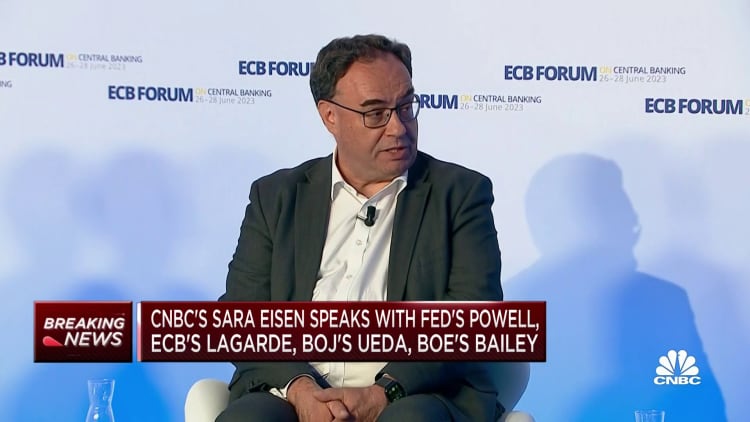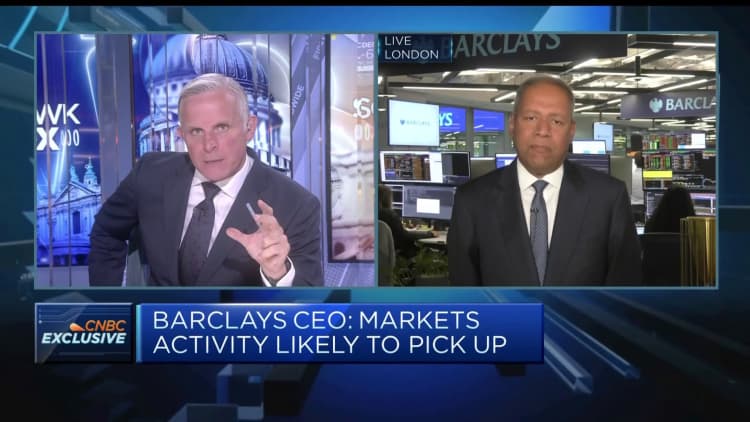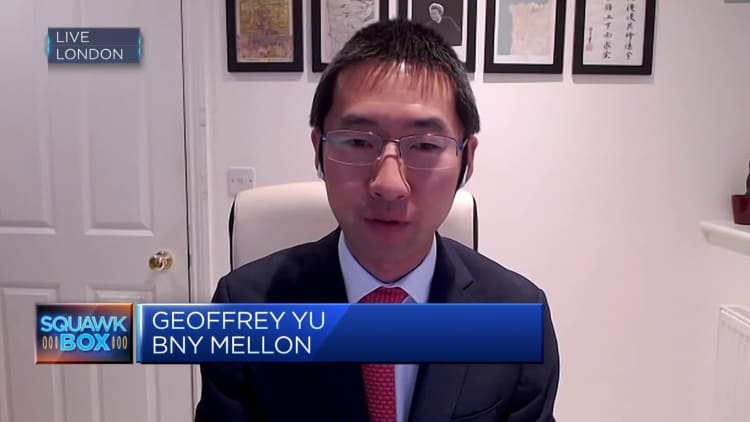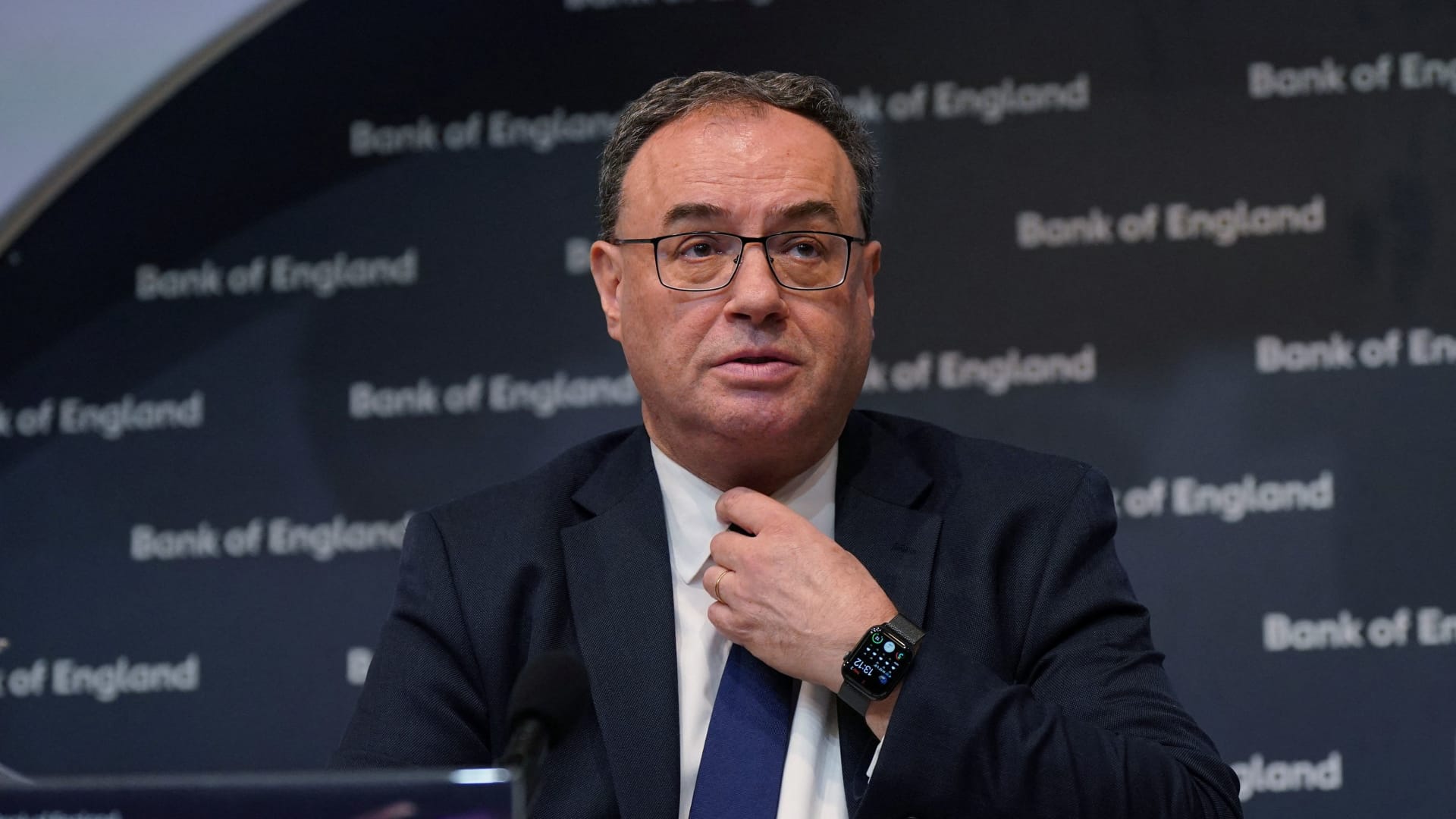Andrew Bailey, Governor of the Bank of England, attends the Bank of England Monetary Policy Report Press Conference, at the Bank of England, London, Britain, February 2, 2023.
Pool | Reuters
LONDON — Market expectations are split over the Bank of England’s next monetary policy move on Wednesday, as policymakers near a tipping point in their fight against inflation.
As of Tuesday morning, the market was pricing around a 62% chance that the Monetary Policy Committee will opt for a 25 basis point hike to interest rates and take the main Bank rate to 5.25%, according to Refinitiv data.
The other 38% of market participants expect a second consecutive 50 basis point hike, after the central bank surprised markets with a bumper increase in June. U.K. inflation looks to be abating, but is still running considerably hotter than in other advanced economies and well above the Bank’s 2% target.
Headline consumer price inflation slid to 7.9% in June from 8.7% in May, while core inflation — which excludes volatile energy, food, alcohol and tobacco prices — stayed sticky at an annualized 6.9%, but retreated from the 31-year high of 7.1% of May.
Data from the British Retail Consortium on Tuesday also showed annual shop price inflation cooled from 8.4% in June to 7.6% in July, and fell for the first time in two years in month-on-month terms, indicating that the country may be through the worst of its prolonged cost-of-living crisis.

The British economy has proven surprisingly resilient, despite a run of 13 consecutive rate hikes from the Bank of England. The U.K. GDP flatlined in the three months to the end of May, but Britain is no longer projected to fall into recession.
Goldman Sachs noted over the weekend that the MPC will be watching three indicators of inflationary persistence to determine how much additional monetary policy tightening is needed — slack in the labor market, wage growth and services inflation.
“Following a very strong April labour market report in the run-up to the June meeting, jobs activity softened notably in May. Wage growth, however, has remained very firm with private sector regular pay rising further to 7.7%,” Goldman’s European economists James Moberly, Ibrahim Quadri and Jari Stehn highlighted.
“While core inflation surprised to the downside in June, services inflation momentum remains strong. BoE officials have provided little guidance on how they assess the incoming data since the June meeting.”
Given the limited read on how the MPC has received the latest two months of economic data, Goldman said this week’s meeting is a “close call,” but that the 25 basis point move is more likely than another half-point hike. The Wall Street giant expects an 8-1 split vote, with the one dissenting opinion in favor of keeping rates unchanged.

“The overall dataset, while firm, is more mixed going into the August meeting than it was in the run-up to the June meeting, when data on the labour market, wage growth, and services inflation had all been surprising to the upside,” the economists said.
“Furthermore, this week’s developments — including the weak flash PMI, non-committal messaging from the Fed and ECB, and receding market pricing for the August meeting — would support the case for a 25bp increase.”
Both the U.S. Federal Reserve and the European Central Bank implemented quarter-point hikes last week and struck cautious tones. They highlighted that inflation is heading in the right direction but retains a hawkish tilt as it remains above target.
MPC happy to ‘front-load’ tightening
The initial PMI (purchasing managers’ index) readings for July indicated that the slowing economic momentum in the second quarter had continued into the third — especially in the services sector, where the Bank of England’s aggressive rate hikes finally appear to squeeze demand.
Consumer confidence also fell sharply in July, and the latest figures put unemployment at 4% — above the Bank of England’s May forecast — with vacancies continuing to decline.
The labor market remains very tight despite some loosening, and observers still marginally favor another big hike on Thursday.
Barclays believes a half-point increase is in the cards, as wages and core inflation stay high, meaning more “resolute action” is a chance for the beleaguered MPC to “enhance credibility.”
“We expect an 8-1 vote split (for +50bp vs hold), unchanged forward guidance, and for the forecasts to explicitly incorporate greater inflationary persistence,” Barclays economists Abbas Khan, Mariano Cena and Silvia Ardagna concluded in a research note Friday.
This was echoed by BNP Paribas European economists Matthew Swannell and Paul Hollingsworth, who said that the MPC will be willing to “front-load” tightening, based on Governor Andrew Bailey’s comments at the Sintra central bank conference.

“If we were really of the view that we were going to do 25 and then we were really sort of baked in for another 25 based on the evidence we’d seen, it would be better to do the 50,” Bailey justified the jumbo hike of June.
“Even allowing for the inflation surprise, the data we have seen since June’s meeting clearly support the MPC delivering more than 25bp of further tightening, in our view,” Swannell and Hollingsworth said.
Looking beyond this week’s meeting, Goldman Sachs said the meaningful progress in rebalancing labor market supply and demand so far was not yet sufficient for this to be the last increase in the Bank’s base rate, since further demand cooling and a sustainable return to the 2% headline inflation target are a long way off.
“That said, this assessment is subject to significant uncertainty depending, in particular, on the growth outlook, the outlook for labour supply, and the formation of inflation expectations,” Goldman economists added.
The lender therefore expects further 25 basis point increments to an eventual peak rate of 5.75%, or until the MPC sees signs of a meaningful slowdown in spot wage and services inflation.

